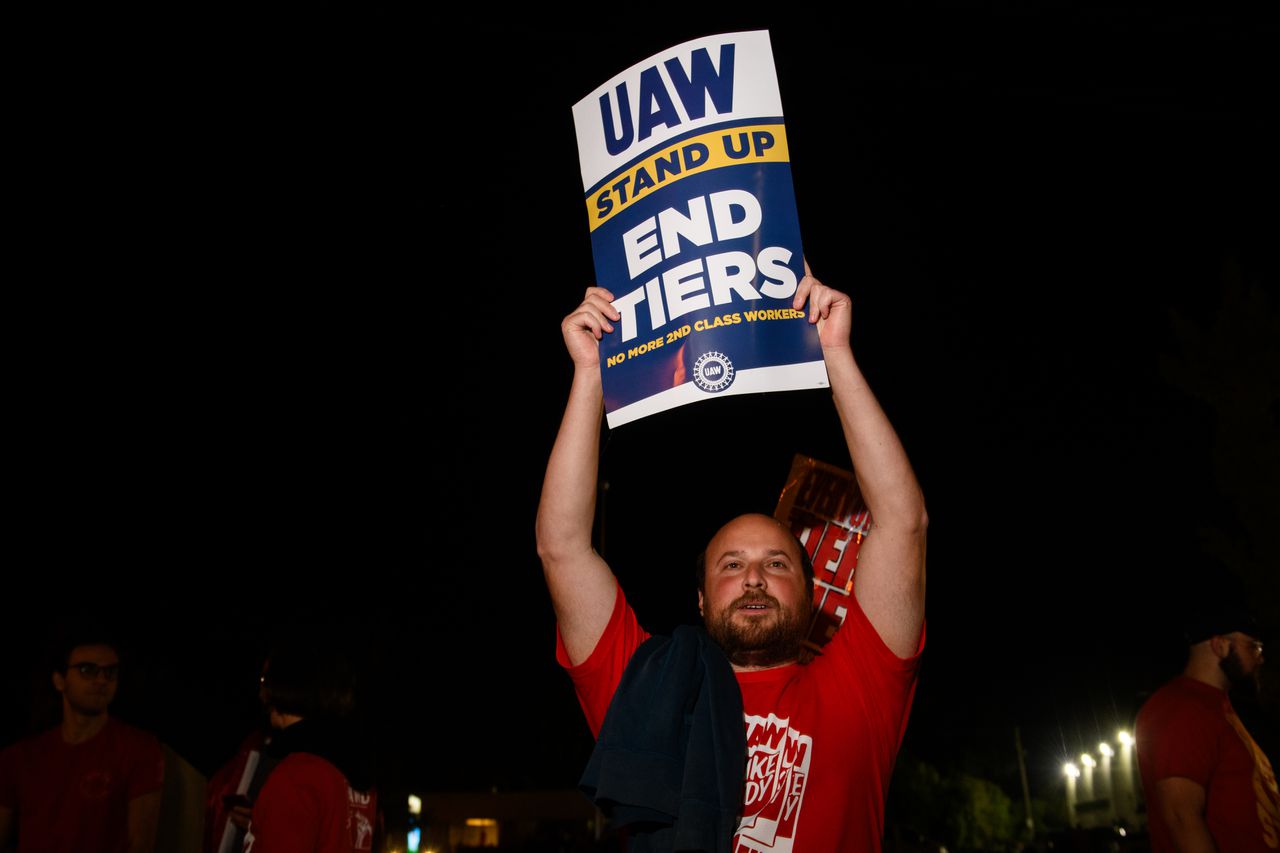UAW strikes all 3 Detroit automakers at once for first time
After nine weeks of bargaining the United Auto Workers and the Big Three have not reached an agreement.
A contract for the nearly 150,000 UAW members across the country expired at 11:59 p.m., prompting a strike. For the first time in the union’s 88-year history all three Detroit automakers, Stellantis, Ford and General Motors, are the strike targets.
At 10 p.m. Thursday, UAW President Shawn Fain announced three locals – only one in Michigan – were selected to start the strike at midnight. Those locals represent Ford Michigan Assembly Plant in Wayne, Stellantis Toledo Assembly Complex and General Motors Wentzville Assembly Center in Missouri.
Inside Ford Assembly, workers erupted when they heard Local 900 was chosen to start the strike. Ford told overnight workers to leave early, go to the union hall and stay off Ford property.
Less than an hour after Fain ended his Facebook Live, a crowd of 50 or more UAW workers were gathered at UAW local 900′s office outside the plant, which produces the Ford Ranger and Ford Bronco. As the crowd grew, many made their way to the median to hold signs to passing cars along Michigan Avenue.
Tiff Williams, 56, of Wayne has been working at the plant for 30 years. With retirement on the horizon as a legacy worker she said her fight is for the younger generation and the Tier 1 employees who don’t have the same hourly wage or pension she was grandfathered into.
This will be her first strike but Williams said she’s been saving in preparation for the pay cut that will come with the $500 weekly strike allowance. “If you want what you want you got to fight for it,” she said.
Unlike previous strikes, the UAW is strategically selecting local union chapters to strike automakers on a rolling basis rather than a full walk out of all members. The union is also going after all three companies rather than picking one target.
Fain told members that a simultaneous walk out is still possible but the targeted approach give the negotiation team more leverage. “If we need to go all out. We will. Everything is on the table,” he said Thursday night.
Automakers were quick to fire back. “We are extremely disappointed by the UAW leadership’s refusal to engage in a responsible manner to reach a fair agreement in the best interest of our employees, their families and our customers,” Stellantis said in a statement. “We immediately put the company in contingency mode and will take all the appropriate structural decisions to protect our North American operations and the company.”
For the first time in union history all three companies came to the UAW’s Solidarity House downtown Detroit, Fain said.
All three automakers made multiple counteroffers but none of been accepted.
Brandon Szczesniak, 21, of Dearborn is a third generation Ford employee who works at the Wayne assembly plant. He already lives paycheck to paycheck making $19 an hour. The 40% wage increase the UAW is demanding would be “life changing” he said. “I wouldn’t have to decide between gas money and food money anywhere,” he said. “There’s been times where I didn’t know if I was gonna be able to make it to work because of gas.”
Szczesniak has seen his hours decrease since he started in 2021, making his overnight shift less lucrative.
A major talking point has been the wage increase the UAW stuck to throughout negotiations. The hike comes from the estimated pay raise the CEOs have received since the last contract was ratified.
General Motors last offer was 20% over four and a half years with a 10% bump in the first year. Ford was also at 20% and Stellantis came in at 17.5% over the life of the contract.
“Ford has bargained in good faith in an effort to avoid a strike, which could have wide-ranging consequences for our business and the economy,” Ford said in a statement Thursday night. “It also impacts the very 57,000 UAW-Ford workers we are trying to reward with this contract.”
Hourly employees would take home nearly 60% less on average with UAW strike pay than they would from working, Ford noted. “And without vehicles in production, the profit-sharing checks that UAW workers could expect to receive early next year will also be decimated by a significant strike.”
Its latest offer was historically generous, the company reported in the hours before the strike began.
Ford’s CEO Jim Farley took to cable news on Thursday night saying the wage hike in addition to shortened work weeks would put the company into bankruptcy.
“You want us to choose bankruptcy over supporting our workers,” said Farley, in a CNBC interview.
In a Thursday statement touting General Motors’ latest offer CEO Mary Barra added, “Remember: We had a strike in 2019 and nobody won.”
Early Friday, Gerald Johnson, GM executive vice president of global manufacturing and sustainability, said in a video response he believes the company made four compelling offers, and bargaining teams will continue to work with the goal of securing a contract that “rewards team members” and “protectors our company’s future.”
“We want everyone back to work doing what we do best, producing vehicles for our customers, and doing it safely, and doing it as one team… we shouldn’t allow this to distract us any longer than is has to,” he said.
Fain says the companies were slow to come to the table at the beginning of negotiations.
The UAW filed bad faith bargaining claims against General Motors and Stellantis for allegedly not offering counter offers in a timely matter. Both companies say the claim is baseless.
